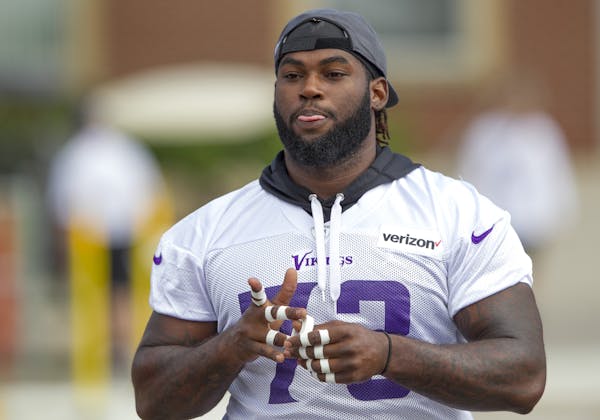Inside the Vikings' crowded defensive backs room, Anthony Harris is at the front of the class.
Perhaps that helps explain how Harris, once undrafted from the University of Virginia, has become coach Mike Zimmer's go-to fail-safe at safety whenever starters Harrison Smith or Andrew Sendejo are sidelined. It's those three — Smith, Sendejo and Harris — who anger teammates whenever Jerry Gray, the Vikings' defensive backs coach, tosses them a softball during the competitive weekly pop quizzes in the DB room.
"Because it's like — that's too easy for him," safety Jayron Kearse said. "For Anthony, and guys like Dejo, you can't give them the simple ones; you've got to give them the toughest ones you've got. You've got to try to get them to miss one, because they're on it every time."
Harris was in the right place at the right time when he twice intercepted Bears quarterback Mitchell Trubisky in Chicago. Heading into his fourth straight start Sunday night against the Packers, Harris has given the Vikings more to think about with three safeties — Harris (restricted free agent), Sendejo ($5.5 million team option) and George Iloka (unrestricted free agent) — nearing the end of contract seasons.
Zimmer was noncommittal when asked if Harris had done enough to keep the starting job over Sendejo, who will miss his sixth game in a row on Sunday night because of a groin injury.
"I'll worry about that when the time comes," Zimmer said. "I mean, Anthony's done a good job. I've said this before, he's a very smart player; very visual, sees things well so he can anticipate and get breaks. Very rarely does he make mistakes. There were a couple the other night, but yeah, he's doing good."
Mental errors top Zimmer's list of pet peeves. It's why you rarely see rookie defensive backs get a lot of playing time in the Vikings defense. The lack thereof is why you've seen the 27-year-old Harris start at least two games in each of his four NFL seasons in Minnesota.
In a Vikings defensive culture where knowledge is currency, Harris is rich.
Just listen to him explain a thorough checklist before the first interception off Trubisky, who thought he had an open receiver down the middle between Harris and Smith.
"Try to disguise a good bit pre-snap, just seeing where their personnel is, checking out the different matchups," Harris said. "Eliminating threats, reading the QB and getting a good break on the ball."
Harris prides himself on knowing the responsibilities of nearly every defender in the Vikings defense. It helps him understand how his split-second decisions impact his teammates, and conversely how they can also set him up for success. His second interception off Trubisky tells that story.
"Holton [Hill] did a good job of rerouting the receiver," Harris said. "Messed up the timing. Thinking [Trubisky] might've thrown the ball off his back foot. I think he might've been under a little pressure. The ball sailed, and I was in the right position."
Kearse might be the least surprised of Harris' teammates.
Kearse joked he "disliked" Harris upon being drafted by the Vikings in 2016, because a few years prior the Clemson and Virginia safeties wrestled over the ACC interceptions lead. When the Tigers and Cavaliers played in November 2013, Kearse gained a step on Harris with his third interception of the season.
"Next drive, he gets the pick," Kearse said. "I just can't get around him. I definitely knew he was a ballhawk."
Harris eventually led the ACC with eight interceptions that season. Now they compete in the Vikings meeting room, where Kearse — who has earned his own role in the defense — admits he's still chasing Harris.
"He knows a whole bunch of football, knows a lot about the linebackers, D-line, all sorts of things," Kearse said. "Gives him an edge over a lot of guys that could be more athletic, could be faster, but he knows a whole lot of football. He knows what's going to come before it comes."
Anze Kopitar scores in overtime, Kings beat Oilers 5-4 in Game 2 to tie series
Thunder's Holmgren bests Pelicans' Valanciunas in center matchup to help OKC take 2-0 lead
AP PHOTOS: Russian kids ride sticks with a horse's head in hobby horsing competition
Defending champion Golden Knights beat Stars 3-1 to take 2-0 series lead home to Vegas

